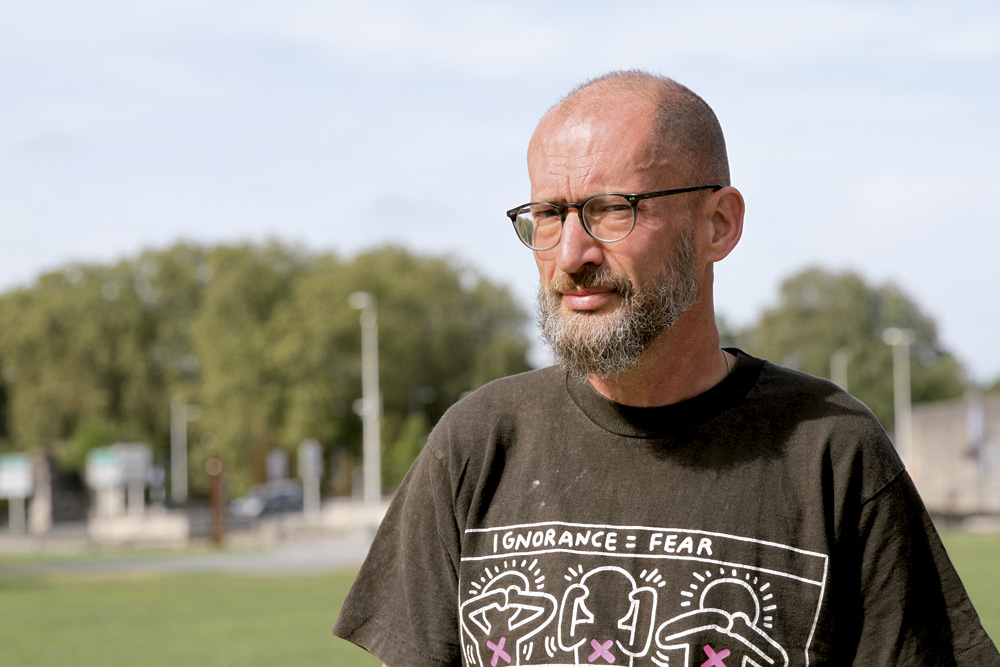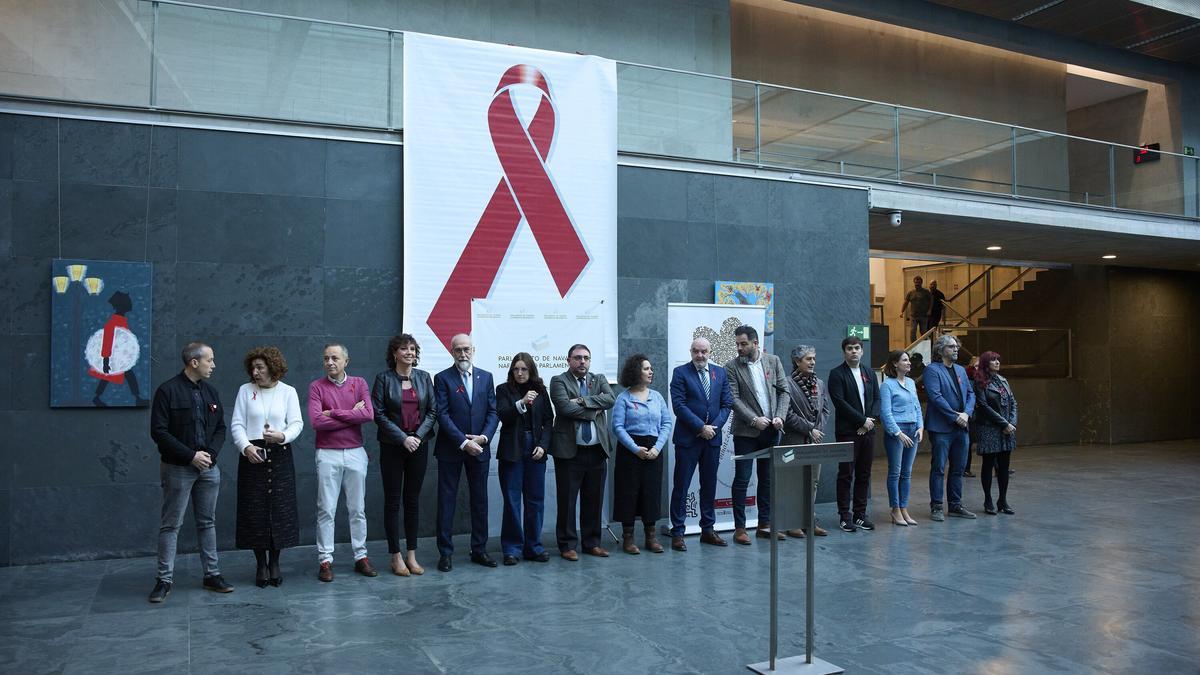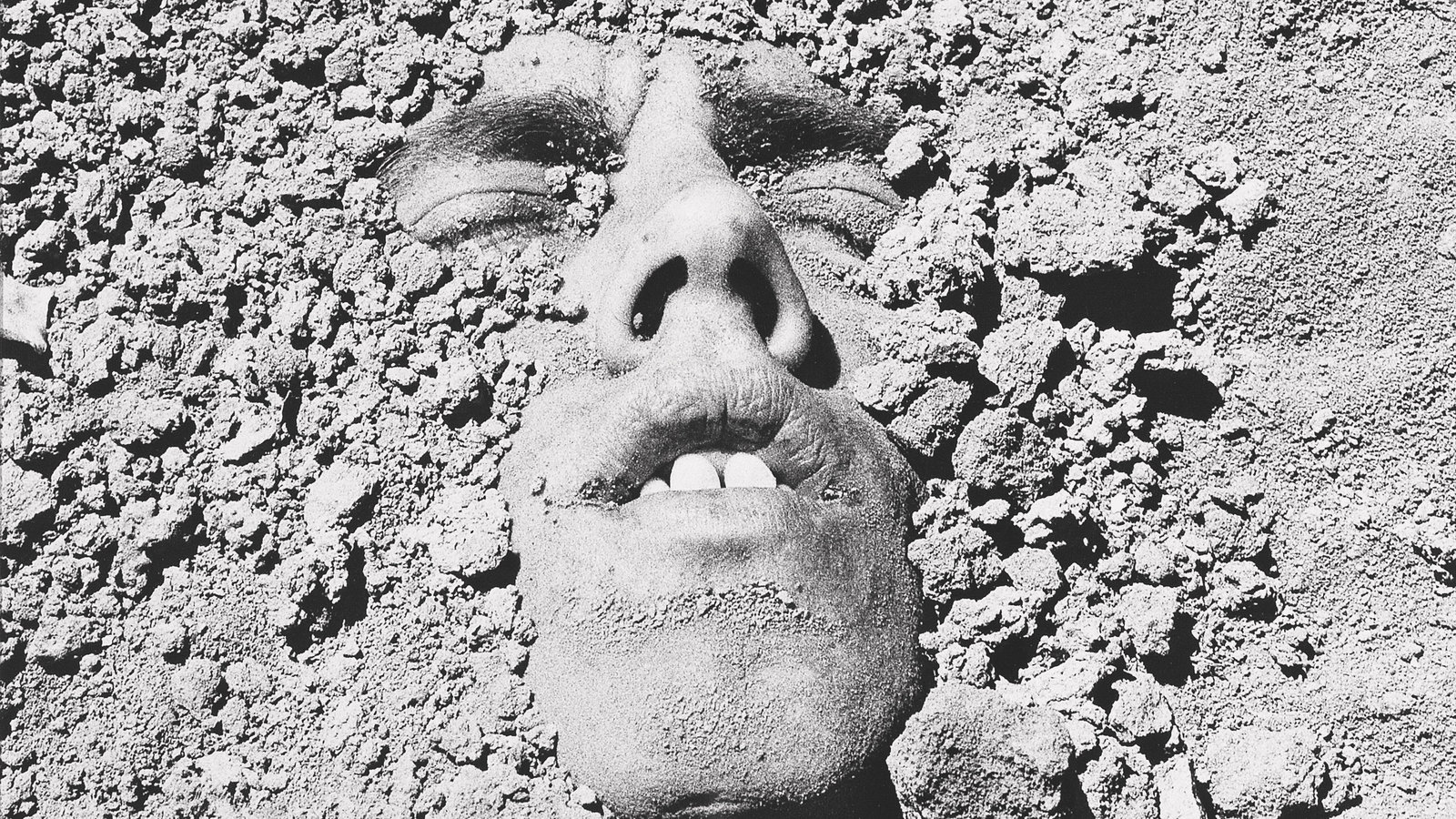"In the French gay community, there's selfishness and racism that bothers me."
- The fact that 120 battements for minutes (120 beats per minute) have won the Golden Palm of Cannes has brought a secret story to light. The fight against AIDS began in the late 1980s in the city of Toulouse. One such militant who has revolutionized the indifference of society and the authorities is Didier Lestrade, who was the first president of the Paris Act Up.

Hiesaren kontrako borrokaren aurpegi ezaguna da. 1986 urteaz geroz seropositibo, Act Up New York-en hasieran parte hartu eta bi lagunekin Parisko taldea osatu zuen bi urtera, 1989an. LGBT komunitatearen aldeko militante sutsua ere bada. Ogibidez kazetaria. Têtu aldizkaria sortu zuen 1995ean, Minorité aldizkariaren erredaktoreburu izan zen 2009tik 2014ra eta hainbat komunikabidetan kolaboratzen du. Hainbat liburu ditu argitaraturik.
Act Up was born in New York in 1987. Two years later, you created Paris.
We were about fifteen at the foundation of the association. We were based on the example of the United States; they were so big that every week they sent their documents to other groups worldwide. They were a great source of information and inspiration. The first year was very hard: we had no experience, we had to fix ourselves, we didn't have money, we didn't have homes, we did everything in my house. Two years later, when we saw that we were always there, he began to change his mind.
The first thing you had to do was understand the virus, which was unknown.
The medical committee was the first one we created. We trained ourselves, apart from one or two people, because no one had knowledge in this field. We understood it and popularized it. But we didn't always understand it, it was very complex and in the arts we also did what we understood.
Complex and hard.
It wasn't easy, but we didn't have a choice. We had a responsibility to complete the information that came to us from the doctors, because at the time when it was up to us to know very little, and because the medical counter-reports were essential. When we're sick, it's hard to see how the disease is eating inside us. Medicine has a wild part and there were very few of us who were willing to deal with that part.
The laboratories were spaces for action.
Because in this field we had an extreme need. We didn't know how the pharmaceutical industry worked, so we played almost blindly. The only example we had was that the American Act Up had dropped the price of the drug TR by 10 percent because of an action that was contrary to the Burroudies-Wellcome lab. We saw that a simple action allowed us to lower the price of the drug too expensive. We prepared the meetings we had with them well, we did everything to destabilize them. Because they were politicians to be kind, we had the opportunity to be helpless. Be a maricon, exaggerate the marizoro area... They weren't used to it, and we used our weapons.
Maricas and punkis. You happened to find yourself in this secret universe of medicine.
We had as principles that medical research cannot be carried out without a patient. Ernio would already inform us about the effects of the curator. We managed to break the walls that protected the industry and started to give some information. We gave him a little bit, and we systematically asked for more. If they didn't give us that, we would do an action. Until 1992, the Bristol-Myers Squibb laboratory was the first to understand that they had to work with the associations. For the first time, we came across a lab that we heard and understood. “If Bristol-Myers Squibb does that, why not you?” we asked other labs.

You've gone from being marginalized to being part of it.
We set up the group between various associations, and we started meeting with the labs. When they were faced with a coalition made up of associations of different words and tendencies, they had to forcibly abandon some power. From 1994 onwards, instead of having one or two representatives, there were seven meetings! The change in relations between activists and laboratories was evident. Activists from the United States and France, as multinationals located between the stake, had to have the same strategy here and there.
In the end, to the point of having good relationships.
Relationships improved when they understood that we were promoting their products. The actions we were taking to destroy them, and yet all actions increased the value of their stock market. It was amazing. But we, the goal was to bridge that gap between research and marketing, which allowed us to save many lives.
Laboratories, State and Church. You didn't have little goals.
At first we were shocked by the very idea of attacking those gigantic powers, but we soon realized that it could be nice. It was a pleasure. In the face of our smallness, such gigantic goals were projected that we could do what we wanted. They had the power by their side, but we were afraid, and that's what led to progress.
“We had as a principle that we could not carry out a medical investigation without a patient”
You also found pleasure.
In addition to talking, we had the power to paste, to speak and to touch at the same time. When we are HIV-positive, without power or voice, that is, without shadow in the face of disease and society, it is a pleasure to realize that we have a strength and that we can use to weaken the destiny.
Surrounded by illness and death, in an environment of social indifference, how did they manage to preserve hope?
The Act Up actions are known, but not focused on the interior environment. Fear dominated us and cohesion and friendship were essential to move forward. Of course, there was individuality, but what was important was the collective, the idea of the chosen family was strong. However, we had great conflicts. I wrote my worst text when I left society, I had to pull the one from the inside.
You also worked on HIV-positive identity.
Other associations that did not want to mention the link between homosexuality and AIDS affirmed that it was not necessary to put themselves in the front line. Gay Even in pride they didn't see us with good eyes. We didn't think the same thing. Further away, we said there was HIV-positive identity, and we decided to develop it. Because if they didn't develop, people would live like a complex. We value being HIV-positive, honoring that identity. We agree that it cannot be presumed to be proud, but the only option left was to proudly claim the symbol of discrimination and fear.

It also highlights Lesbian's role in the Act Up.
Lesbian's commitment was spectacular from the beginning, as lesbians have been cement within the Act Up. In San Francisco, at the hardest moments of its beginnings, in 1981, lesbians were the first to donate blood. Subsequently, from 1994 onwards heterosexuals arrived. That's when Act Up got underway, because in addition to being a coalition of forces, we became a gender coalition. Each community provided its own ethics and culture to the group. We laughed sincerely at the heterosexuals, but somewhere they had to go through the rite of filtration. Many heterosexuals claimed in the Act Up that they were in a situation of subordination to gays.
The struggle you have brought has been secret.
Telling the story of these militants has been one of the objectives of the screenwriters of the film, Robin Campillo and Philippe Manrad 120 battements par minute. It hurt them to see this page of the forgotten or disfigured story. The years have passed and they have talked about Act Up and “have you still told us about that? “The people said, until it almost gives us a feeling of shame for representing that memory. I fully understand that times have changed and that there are other issues at the center of the plaza, I do not always speak of Act Up either. But it is a pity to see how they wanted to punish this struggle with oblivion. Of course, the film is the one that drives that.
Some militants also wanted to forget it.
When the treatments appeared, the movement relaxed; people wanted to move forward, join private life. For many years, his entire life went to the Act Up. Our actions and our speeches had a truly dramatic aspect, and we were always publishing the bad news. It turned against us, the atmosphere got us tired. It was just as bad that we had an intimate environment that would compensate for that environment.
You're criticized by the current gay community in France.
Gays have become privileged and no longer care about the other. The best example is homosexual marriage. We win this right by setting aside the creation of children with the medicine that we promised lesbian women. We once again sacrifice lesbians to take a step forward. On the other hand, what will happen to old HIV-positive people in old age? We have very complicated add-on problems. At this point, for example, my teeth fall down.
“Transsexuals are the vanguard of our struggle, not those of 30 years but those of 15!”
You regret that it is not of a political nature.
If we say that there is an LGBT community, we must act like a community. However, the spirit of community does not go fast in France, because gays act as privileged. Just as poor peoples must achieve what the rich countries have achieved in terms of AIDS, both lesbians and transsexuals must achieve what is achieved by gays. In England or Germany, there are LGBT groups that deal with immigrants. Why not in France? The egoism and racism that bothers me are in the French gay community. Today's gays just want to fight. They're in ligar applications and it's OK, I'm also, but we're too selfish, in the same selfishness as before the epidemic. Another aspect of this egoism is that many well-known people don't come out. If you can't do something good for them and for the community, I don't trust you.
These criticisms also apply to heterosexuals.
It's true. But I would say that heterosexuals have changed a lot more than gay people. There is more tolerance and I think it is also the result of the fight against AIDS, because they stopped looking at form or class and joined in helping each other. I would say that today I am almost the opposite of before. Before I only felt good with gays, now it's the opposite, I feel better with heterosexuals. It is appalling to say so! [laughs].
Homonationalism is increasing.
In general, it is a trend towards immigrants. It is, above all, a reflection of the rejection of the religion of others. This issue bothers me because I am the son of a settler, I was born in an Arab people. “We will be interested in them when they are tolerant of women and gays” is a very imperialist trend. Before totally anticlerical, I was anti-religious, but I understood that I had to change, on 11 September 2001 the following day. Religion is part of individual freedom. We cannot confine the person to his religion, as we cannot confine him to his sexuality. It's important, but not everything.
It is not easy for minorities in France.
Ethnic minorities suffer almost social apartheid. One of the main reasons is that our colonial past has never been repaired. France must forgive Algeria and the other colonies it has had. This context feeds the grudge on the different. White gay people are afraid of diversity. Paradoxically, in the 1970s, there were more gay and Muslim contacts. More and more are voting on the right and on the National Front. This is the first time that the Fn has managed to seduce homosexuals over the years.
Perhaps the fact that the LGBT group becomes a “community” no longer makes sense.
I think we have to maintain the idea of community. There may be tolerance. Transsexuals are the vanguard of our struggle. They do not speak transsexuals of 30 years, but of 15 years, that is, a new youth. I think the concept of identity is going to change radically and it's going to feed the movement, whether or not it should. The agenda is set by a minority within the minority.
Is the gay community ready for it?
No, but you will have to accept it. With the fight against AIDS the same happened, at first they did not want it, but in the end, those who criticized us were with us. I think the militant movement has always been led by freaks. We had them at Act Up, and they were leading the team. Transsexuals are the community freaks, and we'll act on them.
Hego Euskal Herrian 2020an 134 kasu positibo atzeman dituzte. Abenduaren lehena da Hiesaren Aurkako Nazioarteko Eguna, eta NBEk ohartarazi du oraindik pandemia hori ez dela amaitu; iaz munduan 680.000 pertsona hil ziren hiesarekin lotutako gaixotasunen ondorioz.
Passionate, guerrilla, passionate 120 battements par minute, like the activism of Act Up. The 1990s are the beginning and AIDS kills a lot of people in France (also), but Parisian activists are not willing to give up, they struggle to put pressure on institutions and... [+]
GIBari heltzeko garaian, guk uste dugu arlo biomedikoan soilik oinarritzen den estrategia ez dela nahikoa LGTB+ komunitateak sexu-osasunean dituen premiei erantzuteko. Lesbiana, Gay, Transexual eta Bisexualen Estatu Federazioak diskurtso inklusibo bat jarri nahi du agerian... [+]
Sutsua, gerrillaria, pasionala da 120 battements par minute, Act Up taldearen aktibismoa bezalatsu.
Madrilgo Alcala-Meco espetxean da dagoeneko gaixo larrien zerrendan dagoen Ibon Iparragirre euskal preso ondarrutarra. Pneumonia zantzuekin ospitaleratu zuten maiatzaren 31n, baina ekainaren 8ko arratsaldean eraman dute berriz ere kartzelara.
Osasunaren Mundu Erakundeak (OME) diru gehiago erabiltzen du urtero bere 7.000 kideen bidaiak ordaintzeko osasun publikoaren aurkako zenbait mehatxu larriri aurre egiteko baino, Associated Press (AP) berri agentziak eskuratu duen barne-txosten batean ikus daitekeenez.
























